The price of charging a typical electric vehicle (EV) using a rapid charger has risen by £10 since May, according to RAC research.
On average, rapid charge points now cost 63p/kWh – an increase of almost 19p in four months.
The increase – caused by the soaring costs of wholesale gas and electricity – means that it now costs drivers on average £32.41 to rapid charge a typical family-sized electric car with a 64kWh battery to 80%, which is up nearly £10 (£9.60) since May and £13.59 compared to a year ago.
Drivers using ultra-rapid chargers - that have a power output of more than 100kW - have seen average charging costs increase by a quarter (25%), or 13p/kWh, since May with the current average price of charging sitting at 64p/kWh.
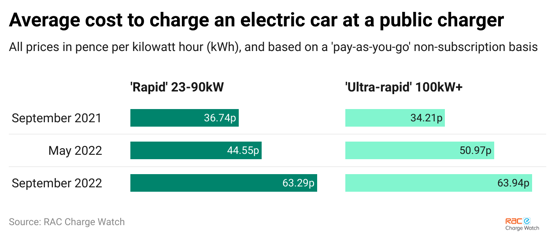
Osprey Charging was forced to increase its rapid charging rate to £1 per kWh, earlier this month.
Based on the RAC’s figures, a driver that exclusively uses a rapid or ultra-rapid charger on the public network will now pay around 18p per mile for electricity. The RAC said this compares to 19p per mile for a petrol car and 21p per mile for a diesel one, based on someone driving at an average of 40 miles to the gallon.
Fleet News analysis has already shown that the cost of charging an electric vehicle (EV) at home, on a standard variable tariff, is set to increase by around 20% this winter.
Ofgem confirmed the latest energy price cap rates, which rise from 28p/kWh to 34p/kWh, following the Prime Minister's Energy Price Guarantee announcement.
It puts the cost per mile for an average-sized EV driven ‘reasonably efficiently’ at around 9p.
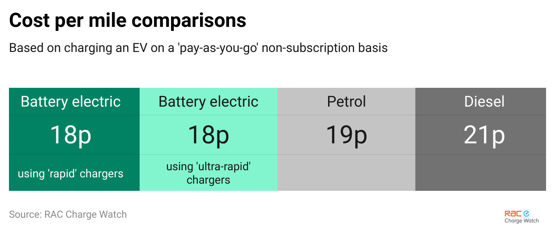
RAC EV spokesperson Simon Williams said: “For those that have already made the switch to an electric car or are thinking of doing so, it remains the case that charging away from home costs less than refuelling a petrol or diesel car, but these figures show that the gap is narrowing as a result of the enormous increases in the cost of electricity. These figures very clearly show that it’s drivers who use public rapid and ultra-rapid chargers the most who are being hit the hardest.
“The Energy Price Guarantee benefits those drivers who are fortunate enough to charge their cars at home, but for those that rely on the public charging network – including those without driveways – it’s a much bleaker picture right now.
The RAC expressed concern that the cost of rapid charging on the public network risks putting off drivers from opting for electric cars when they next change their vehicles and is therefore backing the FairCharge campaign’s call for a reduction in the VAT rate for public charging to 5%.
Williams added: “Last week, charge point operators got behind the RAC-backed FairCharge campaign in calling for the Government to end the inequity that exists between drivers who can charge at home and those that cannot, by cutting the 20% VAT charged on electricity at public chargers to match the 5% domestic rate. The Government needs to redouble its efforts in helping drivers to go electric if it is to meet its own net-zero transport objectives and levelling the public and domestic electricity VAT rates would show it is serious about doing so at a time when household budgets are getting ever tighter.”
Quentin Willson, founder of the FairCharge campaign, said: “With electricity costs up by an average of 140% on last year and the Government’s divisive VAT levy of 20% on public charging, EV adoption is under threat. This government needs to act on charging costs, cap rises on public chargers, lower VAT and support charge point operators to build infrastructure. If they don’t, all those years of promises of a zero-emission future, clean air and energy independence will have come to nothing.”
Resaerch from The AA shows that three fifths (63%) of drivers say the rising cost of domestic energy is now a contributory factor in putting them off owning an electric vehicle (EV).
The poll of 12,500 drivers also found that one in 10 (10%) claim the hike in home energy bills is the main reason for sticking with a petrol or diesel car.
Jack Cousens, head of roads policy for the AA, said; “With domestic energy prices rising, drivers can be forgiven for believing switching to an EV will become expensive quickly.
“However, the reality is that even with the hike in domestic electricity costs, running an EV is considerably cheaper than a petrol or diesel car."
Tanya Sinclair, senior director, policy, Europe at ChargePoint, says that, while consumers will be concerned, there are a few things for them to consider.
Firstly, for most drivers, Sinclair argues that the majority of charging takes place at work or home where costs are considerably cheaper.
"DC Fast Charge, which is becoming more expensive due to the energy crisis, is a small part of the equation in EV charging," she said. "It only plays an important role when people drive beyond the range of their vehicle and need to be able to charge their EV quickly."
Sinclair claimed that 90% of the time people charge their vehicles from home or work, which is much more cost effective than DC Fast charging.
"We are at an important moment in the move to EVs, making it crucial for both industry and Government to work together to help increase adoption and bring prices down," she added.
"We encourage the Government to continue developing forward-thinking policies to help the UK reach its 2030 target of ending the sale of petrol and diesel cars, like the ZEV mandate and the requirement for charging operators to roam (be interoperable) with one another.”
Joe Laurence, commercial development manager at Volkswagen Financial Services (VWFS) echoed Sinclair's thoughts. He said: “While the latest figures around EV charging costs being similar to petrol and diesel can seem off-putting, these rates are only when using rapid or ultra-rapid public charging on a PAYG basis.
“This doesn’t factor in home-charging or standard public charge points, which research tells us is where the majority of charging is done. For those who cannot access a home charger, work or public charging is the only option but looking at rapid and ultra-rapid charging costs is comparative to buying fuel at a motorway service station when, in reality, these charge a premium for fuel and don’t reflect the true cost of diesel and petrol elsewhere.
“It’s the classic high-demand, high-pricing model and the rapid or ultra-rapid public charge points cost more as they charge a BEV faster to a captive audience – people in a hurry who need to top up their vehicles.
“That being said, the onus is on the Government to recognise and adapt their electrification strategy. Scrapping the home charging grant has had a negative impact on overall EV uptake despite the Government outlining the 2030 ban.
“In addition, charging 20% VAT for public charging but only 5% for home charging widens that affordability gap and favours those with driveways who are able to install private charge points.
“There are no doubt a lot of complex issues that impact the costing and availability of the charging infrastructure, but this is something that the new Government needs to review and address as the cost-of-living crisis grows.”
> Interested in comparing electric vehicle data? Check out our EV tool.
> Interested in ensuring the efficient use of EVs. Check out our dedicated editorial sections: Insight & policy | EV news | Charging & infrastructure | Costs & incentives | Benefit-in-kind | EV case studies | EV road tests

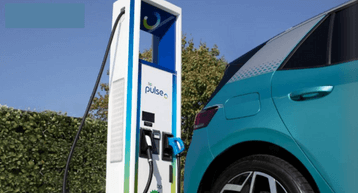



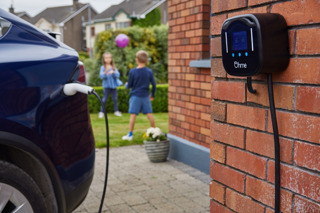
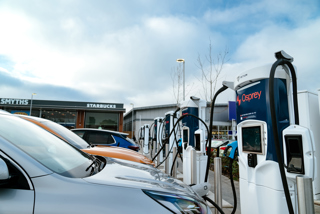
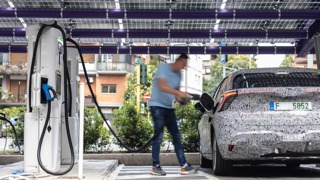












Login to comment
Comments
No comments have been made yet.